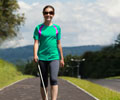Exhilarated scientists announced they had used gene therapy to restore eyesight to children blighted by a rare, inherited form of creeping blindness.
Exhilarated scientists announced they had used gene therapy to restore eyesight to children blighted by a rare, inherited form of creeping blindness.
Youngsters were able to walk unaided around dimly-lit obstacles, take part in lessons at school without extra help, and one child saw the color of his father's eyes for the very first time.The revolutionary treatment targets a disease of light-catching retinal cells called Leber's congenital amaurosis, or LCA.
Caused by flaws in any one of around 13 key genes, LCA triggers severe loss of vision and abnormal eye movements in early infancy, usually leading to total blindness in the twenties or thirties.
Doctors led by Jean Bennett of the University of Pennsylvania School of Medicine tested a way of tackling this tragedy by inserting a corrective gene in a disabled cold virus.
Their study was published online by The Lancet on Saturday, coinciding with a presentation at a conference of American ophthalmologists in San Francisco.
The modified virus was injected into the eyeball, and infected the diseased cells, in effect, acting like a Trojan horse to deliver the right DNA to the retina.
Advertisement
None of the patients recovered normal sight, but all of them had an at-least 100-fold increase in so-called pupillary light response, meaning the constriction of the pupil when exposed to light.
Advertisement
The best results were among four children aged eight, nine, 10 and 11.
All four gained vision that enabled them to walk unaided along a dimly-lit simulated street route.
"Another child, who since birth, could only see light and shadows, stared into his father's face and said he could see the color of his eyes. Later they played soccer together," the university said in a press release.
Normally reserved, the researchers used such words as "dramatic" and "spectacular" to describe the outcome, even though the trial is only a Phase 1 test, the first and most cautious level of a three-phase process to assess prototype treatments for safety and effectiveness.
It comes less than six weeks after another breakthrough in gene vision therapy, in which two monkeys were cured of color blindness.
Gene medicine is one of the most alluring areas of biotechnology, offering the theoretical promise of blocking or reversing inherited disease.
But this new frontier has also been hit by occasional setbacks, notably an unexpected or uncontrollable response from the immune system.
The pioneering treatment for LCA, though, has so far had no side effects and its benefits have remained unchanged two years later, say the researchers.
"These remarkable results have laid a foundation for applying gene therapy not only to other forms of childhood-onset retinal disease, but also to more common retinal degenerations," said Bennett.
In an analysis also carried by The Lancet, Frans Cremers and Rob Collin of Radboud University Nijmegen Medical Centre in the Netherlands predicted a major boost for further gene therapy trials.
But, they wrote, many genetic disorders remained to be uncovered and at present there was little incentive to unearth the cause of minority disorders.
"Except in families in which the recurrence risk for future offspring needed to be known, there has been neither urge nor urgency to systematically identify genetic defects.
"Though the costs to identify the underlying [genetic] mutations are not excessive, in most cases they are not covered by health insurance," they said.
Source-AFP
ARU














